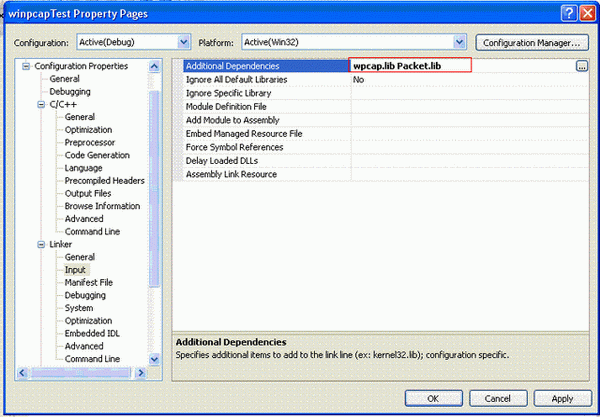Winpcap是一个强大的网络开发库,可以实现许多功能:获取可用的网络适配器;获取指定适配器信息(比如名称和描述信息);捕获指定网卡的数据封包;发送数据封包;过滤捕获的包以获取特定包等。
首先到http://www.winpcap.org/install/default.htm下载安装winpcap 驱动和DLL组件。
然后到http://www.winpcap.org/devel.htm.下载winpcap开发包,解压到指定目录,这里我解压到C:WpdPack_4_0_2WpdPack,可以看到里面包含了:Lib,Include,文档和示例程序。
首先创建一个C++控制台程序,设置如下:
1) 在“Configuration Properties -> C/C++ -> General”中,在Additional Include Directories加入Include路径(“C:WpdPack_4_0_2WpdPackInclude”)。

2) 在 “Configuration Properties -> Linker -> General” 中,在Additional Library Directories中加入 winpcap 库文件路径 ( “C:WpdPack_4_0_2WpdPackLib” ) 。

3) 在“Configuration Properties -> Linker -> Input”中, Additional Dependencies 加入用到的两个winpcap 库文件(wpcap.lib and Packet.lib ) 。
注意:还要添加一个ws2_32.lib库!!!!

4) 为了使用Winpcap的远程访问,必须在预处理器中加入HAVE_REMOTE

示例程序1 获取适配器列表
int _tmain(int argc, _TCHAR* argv[])
{
pcap_if_t * allAdapters;//适配器列表
pcap_if_t * adapter;
char errorBuffer[ PCAP_ERRBUF_SIZE ];//错误信息缓冲区
if( pcap_findalldevs_ex( PCAP_SRC_IF_STRING, NULL,
&allAdapters, errorBuffer ) == -1 )
{//检索机器连接的所有网络适配器
fprintf( stderr, "Error in pcap_findalldevs_ex function: %s ", errorBuffer );
return -1;
}
if( allAdapters == NULL )
{//不存在人任何适配器
printf( " No adapters found! Make sure WinPcap is installed. " );
return 0;
}
int crtAdapter = 0;
for( adapter = allAdapters; adapter != NULL; adapter = adapter->next)
{//遍历输入适配器信息(名称和描述信息)
printf( " %d.%s ", ++crtAdapter, adapter->name );
printf( "-- %s ", adapter->description );
}
printf( " " );
pcap_freealldevs( allAdapters );//释放适配器列表
system( "PAUSE" );
return 0;
}
示例程序2 打开指定适配器并捕获数据包
int _tmain(int argc, _TCHAR* argv[])
{
pcap_if_t * allAdapters;//适配器列表
pcap_if_t * adapter;
pcap_t * adapterHandle;//适配器句柄
struct pcap_pkthdr * packetHeader;
const u_char * packetData;
char errorBuffer[ PCAP_ERRBUF_SIZE ];//错误信息缓冲区
if( pcap_findalldevs_ex( PCAP_SRC_IF_STRING, NULL,
&allAdapters, errorBuffer ) == -1 )
{//检索机器连接的所有网络适配器
fprintf( stderr, "Error in pcap_findalldevs_ex function: %s ", errorBuffer );
return -1;
}
if( allAdapters == NULL )
{//不存在任何适配器
printf( " No adapters found! Make sure WinPcap is installed. " );
return 0;
}
int crtAdapter = 0;
for( adapter = allAdapters; adapter != NULL; adapter = adapter->next)
{//遍历输入适配器信息(名称和描述信息)
printf( " %d.%s ", ++crtAdapter, adapter->name );
printf( "-- %s ", adapter->description );
}
printf( " " );
//选择要捕获数据包的适配器
int adapterNumber;
printf( "Enter the adapter number between 1 and %d:", crtAdapter );
scanf_s( "%d", &adapterNumber );
if( adapterNumber < 1 || adapterNumber > crtAdapter )
{
printf( " Adapter number out of range. " );
// 释放适配器列表
pcap_freealldevs( allAdapters );
return -1;
}
adapter = allAdapters;
for( crtAdapter = 0; crtAdapter < adapterNumber - 1; crtAdapter++ )
adapter = adapter->next;
// 打开指定适配器
adapterHandle = pcap_open( adapter->name, // name of the adapter
65536, // portion of the packet to capture
// 65536 guarantees that the whole
// packet will be captured
PCAP_OPENFLAG_PROMISCUOUS, // promiscuous mode
1000, // read timeout - 1 millisecond
NULL, // authentication on the remote machine
errorBuffer // error buffer
);
if( adapterHandle == NULL )
{//指定适配器打开失败
fprintf( stderr, " Unable to open the adapter ", adapter->name );
// 释放适配器列表
pcap_freealldevs( allAdapters );
return -1;
}
printf( " Capture session started on adapter %s ", adapter->name );
pcap_freealldevs( allAdapters );//释放适配器列表
// 开始捕获数据包
int retValue;
while( ( retValue = pcap_next_ex( adapterHandle,
&packetHeader,
&packetData ) ) >= 0 )
{
// timeout elapsed if we reach this point
if( retValue == 0 )
continue;
//打印捕获数据包的信息
printf( "length of packet: %d ", packetHeader->len );
}
// if we get here, there was an error reading the packets
if( retValue == -1 )
{
printf( "Error reading the packets: %s ", pcap_geterr( adapterHandle ) );
return -1;
}
system( "PAUSE" );
return 0;
}
示例程序3 发送数据封包
int _tmain(int argc, _TCHAR* argv[])
{
pcap_if_t * allAdapters;//适配器列表
pcap_if_t * adapter;
pcap_t * adapterHandle;//适配器句柄
u_char packet[ 20 ]; //待发送的数据封包
char errorBuffer[ PCAP_ERRBUF_SIZE ];//错误信息缓冲区
if( pcap_findalldevs_ex( PCAP_SRC_IF_STRING, NULL,
&allAdapters, errorBuffer ) == -1 )
{//检索机器连接的所有网络适配器
fprintf( stderr, "Error in pcap_findalldevs_ex function: %s ", errorBuffer );
return -1;
}
if( allAdapters == NULL )
{//不存在人任何适配器
printf( " No adapters found! Make sure WinPcap is installed. " );
return 0;
}
int crtAdapter = 0;
for( adapter = allAdapters; adapter != NULL; adapter = adapter->next)
{//遍历输入适配器信息(名称和描述信息)
printf( " %d.%s ", ++crtAdapter, adapter->name );
printf( "-- %s ", adapter->description );
}
printf( " " );
//选择适配器
int adapterNumber;
printf( "Enter the adapter number between 1 and %d:", crtAdapter );
scanf_s( "%d", &adapterNumber );
if( adapterNumber < 1 || adapterNumber > crtAdapter )
{
printf( " Adapter number out of range. " );
// 释放适配器列表
pcap_freealldevs( allAdapters );
return -1;
}
adapter = allAdapters;
for( crtAdapter = 0; crtAdapter < adapterNumber - 1; crtAdapter++ )
adapter = adapter->next;
// 打开指定适配器
adapterHandle = pcap_open( adapter->name, // name of the adapter
65536, // portion of the packet to capture
// 65536 guarantees that the whole
// packet will be captured
PCAP_OPENFLAG_PROMISCUOUS, // promiscuous mode
1000, // read timeout - 1 millisecond
NULL, // authentication on the remote machine
errorBuffer // error buffer
);
if( adapterHandle == NULL )
{//指定适配器打开失败
fprintf( stderr, " Unable to open the adapter ", adapter->name );
// 释放适配器列表
pcap_freealldevs( allAdapters );
return -1;
}
pcap_freealldevs( allAdapters );//释放适配器列表
//创建数据封包
// 设置目标的MAC地址为01 : 01 : 01 : 01 : 01 : 01
packet[0] = 0x01;
packet[1] = 0x01;
packet[2] = 0x01;
packet[3] = 0x01;
packet[4] = 0x01;
packet[5] = 0x01;
// 设置源的MAC地址为02 : 02 : 02 : 02 : 02 : 02
packet[6] = 0x02;
packet[7] = 0x02;
packet[8] = 0x02;
packet[9] = 0x02;
packet[10] = 0x02;
packet[11] = 0x02;
// 设置封包其他部分内容
for( int index = 12; index < 20; index++ )
{
packet[index] = 0xC4;
}
//发送数据封包
if( pcap_sendpacket( adapterHandle, // the adapter handle
packet, // the packet
20 // the length of the packet
) != 0 )
{
fprintf( stderr," Error sending the packet: ", pcap_geterr( adapterHandle ) );
return -1;
}
system( "PAUSE" );
return 0;
}
参考文章:
作者:洞庭散人
出处:http://phinecos.cnblogs.com/